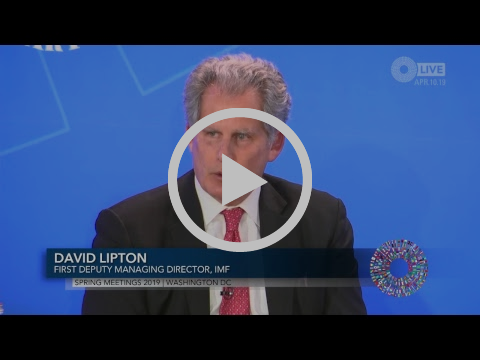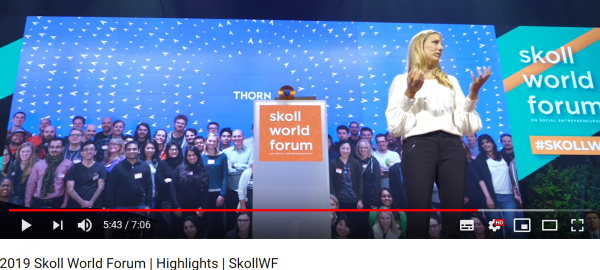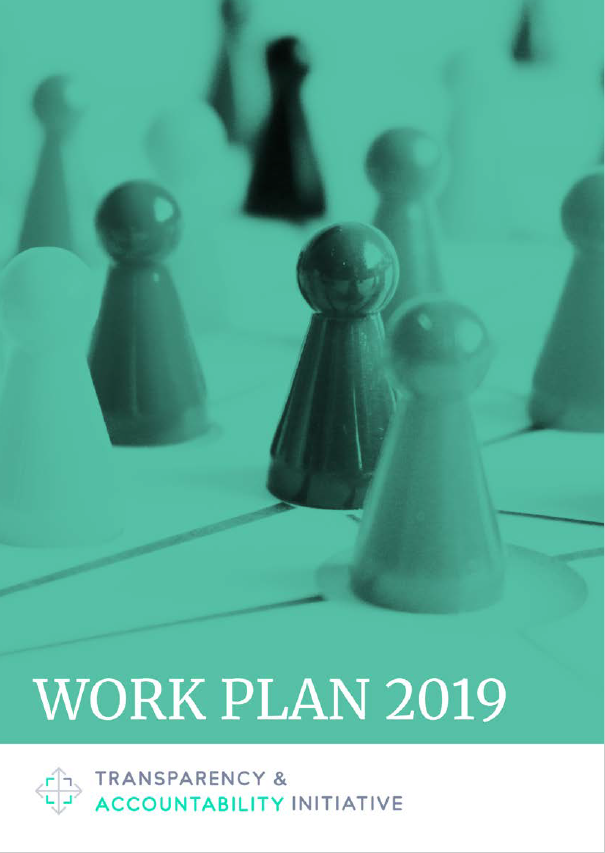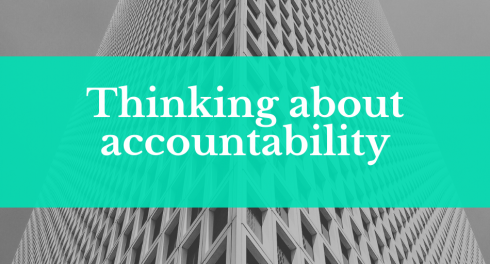Highlights:
- When is an investment not an investment?
- Balance sheets looking for a life raft
- What’s next for public resource transparency?
- Ethical AI = trustworthy?
- Storm clouds persist
- Meaningful connections
- TAI spotlight: evolved approaches to financial transparency to using the law to empower to TAI plans for the year
This past week saw distinct gatherings – for civil society activists in Belgrade for International Civil Society Week, for social entrepreneurs in Oxford for the Skoll Forum, and for Finance Ministers and policy wonks in Washington D.C. for the IMF/World Bank Spring Meetings. Fascinating conversations at each – some featured in this Weekly – but we can’t help but think more creative ideas might have emerged from a mixing of all three.
In case you missed it…
When is an investment not an investment?
 Photo: Ehud Neuhaus from Unsplash
Photo: Ehud Neuhaus from Unsplash
Starting at the Spring Meetings, we were struck by the number of sessions on tax and debt issues in. These included one TAI helped host on civil society roles in promoting more equitable tax systems more generally and in shaping medium-term revenue strategies more specifically. But, did we hear anything really new? One element that caught our eye was that according to Sebastian Beer and Thomas Elkjaer of the IMF, $4 of every $10 in foreign direct investment goes towards “phantom investment” in empty corporate shells. These “phantom investments” don’t bring real economic benefit to the country they’re in and pose a major challenge in the global agenda of increasing domestic resource mobilization.
The IMF are starting to talk more of their support to countries on estimating the “tax gap” between anticipated revenues and what is actually received in government coffers. This is also an important measure for Aaron Krupkin and William G. Gale in assessing how big is the problem of tax evasion. Evasion rates differ across different types of taxes and are relatively high for income taxes. Additionally, Krupkin and Gale argue that sufficiently funding revenue services and making a variety of structural tax changes would help raise collection of taxes owed and mitigate the public concern – at least in the US – that the system may be rigged in favor of the wealthy.
How do we avoid tax evasion in multinational corporations? Daniela Bertossa makes a case to companies to enable further transparency so that governments can develop tax policies that address inequalities and authoritarianism that flows from them. There is some hope in this front following a recent invitation from Members of the Dutch parliament’s financial affairs committee to Shell to send a representative to attend a hearing on tax avoidance by multinationals.
What about taxing tech firms? Tax Watch UK proposes a radical solution to the tax evasion problem in its proposed Google Tax III. Can it prevent big tech from misusing UK double tax treaties? Take a look.
New data reveals that several estate agents breached the UK’s money laundering regulations. Even as the government is cracking down on dirty money, will it back up new laws by improving enforcement? Elsewhere, Global Witness’s investigation has revealed that Claudia Sassou-Nguesso, daughter of President Dennis Sassou-Nguesso of Congo used millions of dollars of apparently stolen state funds to buy a luxury apartment at the Trump International Hotel and Tower in New York City.
Balance sheets looking for a life raft
With lots of finance ministers in town, no surprise that debt issues featured prominently in DC conversations. The key takeaways on how to avert a mounting crisis were debt transparency, understanding reasonable norms of lending and convincing creditors and debtors to be transparent on the amount and terms of debt. Chukwuka Onyekwena and Mma Amara Ekeruche from Brookings Institution go on to offer four suggestions to alleviate this problem: debt management, the issuance of “debt-management” financial instruments, more responsible lending, and streamlining procedures. Do you have any more suggestions? Ideas are welcome as TAI members will be looking explicitly at debt implications for broader fiscal accountability efforts.
Do you think the policies of the IMF and World Bank have aggravated the debt issues of developing countries? Syed Abdul Khaliq from CADTM Pakistan argues that those policies have weakened the Pakistan economy and promoted the interests of elites.
Essential watching

Debt is at record levels in advanced economies and emerging market economies. Can the current international financial architecture facilitate prevention and resolution of debt and financial crises? Or does it need to be reformed? Watch now the discussion amongst Larry Elliott, David Lipton, Fanwell Bokosi, Lee Buchheit, Odette Lienau, and Romuald Wadagni!
What next for transparency in service of safeguarding public resources?
The transparency and accountability agenda has been evolving steadily and it is refreshing to see this translating into shifts in organizational strategies. Ory Okolloh of Luminate (TAI member) explains how their portfolio is shifting as they hope to answer “what does increased transparency and accountability mean for the citizen?” (see more under TAI Spotlight), while Alan Hudson from Global Integrity notes a shift from revolution to evolution as he reflects on growing recognition of how we should focus more on problems, power dynamics, and incentives. No more starting with data or transparency or tools. Instead, there are more examples of efforts to seek to begin with sectoral issues.
Ethical AI = trustworthy?
Can AI ever be ethical? Participants at the Skoll World Forum think that’s asking the wrong question, instead suggesting that AI is like any other technology which can have bad consequences if built on unethical business models or systems of governance. Amnesty International’s Tanya O’Carrol drew particular attention for her argument that the core AI business model of extraction of personal data, what has been termed “surveillance capitalism,” is at the root of the problem. For more highlights from the forum, check out their video recap.

Sticking with AI governance, the EU last week took a big step forward in establishing ethical AI by releasing a set of guidelines that guarantee transparency, explainability, privacy, security and unbiased datasets. Based on the guidelines, trustworthy AI should be lawful, ethical and robust. Additional requirements include human agency and oversight, technical robustness and safety, privacy and data governance, transparency and accountability, diversity, non-discrimination and fairness, and societal and environmental well-being. Are these guidelines a blueprint for other governments to emulate? Already, a member of the expert group that drew the guidelines has slammed the document’s central notion of “trustworthy AI” as “conceptual nonsense.”
Twitter threads on data ownership debates are often similarly misconceived on how to tackle data ownership. Philip Sheldrake instead argues that data is fundamentally interpersonal rather than personal and thus, cannot be owned and governed as a commodity. He suggests that data is essentially worthless in isolation, and only takes on meaning when it interacts with other data to become information, and when that information interacts with other information to become knowledge.
Meanwhile, in the US, Democrats have introduced the Algorithmic Accountability Act of 2019. The bill would require large companies to test their algorithms for “inaccurate, unfair, biased or discriminatory decisions.” It empowers the Federal Trade Commission (FTC) with oversight, but the massively understaffed FTC may not have the resources it needs to oversee such an expansive new issue. Will it increase accountability? Only time will tell.
Thinking of creative models for providing access to data? Open Data Institute has already started working on three data trust pilots and exploring them to find out where they might be useful both in the UK and around the world. Pair with Development Gateway’s three recommendations on how to explore more and better resources for achieving the data revolution. Coordinate and harmonize. Get creative about portfolio design. Be realistic and flexible.
At TAI we’ve been talking with World Economic Forum on what the future of advocacy looks like given digitalization and new quandaries on how information is gathered and used by, for and against civil society positions. Wondering how your charity organization can identify key ethical principles against which they can assess the ethical impacts of digital/data projects? How can they communicate this with their tech partners when developing digital/data projects? DataKind UK offers us nine core principles that charities should consider when developing their ethical code: beneficence, nonmaleficence, anatomy, justice, explicability, open research, community-mindedness, proportionality, and sustainability.
Storm clouds persist
Turning to International Civil Society Week, it’s no surprise that on top of the agenda for the 850+ attendees was the wave of extreme right-wing, nationalist governments around the world that are threatening CSO’s right to protesting and defending human rights. Follow how the discussions went on twitter #ICSW2019. Mobilisation Lab has a particularly good thread highlighting some suggested solutions, including becoming more agile and more welcoming in coalition-building, moving away from seeing laws as the only option for protecting civic space, and avoiding “activism behind closed doors” by being more transparent, reaching out to opponents, and using more accessible language.
One startling number thrown out – only 4% of the world population live in open societies. In Africa, CSOs are under attack by repressive regimes. Recent events like the forced closure of the UN Human Rights Office in Burundi and the temporary suspension of Tanzania’s leading English-language newspaper are worrying observers that things are getting worse. With this in mind, UN High Commissioner for Human Rights Michelle Bachelet urged authorities in Sudan to ensure protection of human rights as they go through a volatile transition following the overthrow of long-time dictator Omar al-Bashir last week. Elsewhere, a Gambian civil society advocate, Killa Ace, was detained by Senegalese Border Force officials leading to missing his flight to CIVICUS International Forum. And a piece in openDemocracy highlights how civic space in Afghanistan, Saudi Arabia, Serbia, Sudan, and Venezuela are becoming even more closed.
The trend has broader development implications – Dalitso Kubalas argues that SDGs will only be achieved if civic space and civic engagement exist in a truly enabling environment for inclusive partnerships.
Meaningful connections
As TAP community funders and CSOs examine constituent connections, a helpful reminder is that deeper connection to constituents takes time and many different forms depending on organizational and advocacy issue context. Fund for Shared Insight share some tips on how to invest in relationship building for meaningful community engagement. Meaningfully connecting goes beyond input and feedback. There are many different ways to connect meaningfully. There is no silver bullet methodology or tool. Funders need to connect meaningfully. There is ample room to strengthen nonprofits’ efforts to connect. Donors can help nonprofits connect more meaningfully.
Thinking of enhancing organizational collaborating, learning and adapting practices? Learning lab’s toolkit offers some recommendations – starting with some internal motivation and openness to trial and error to be sustainable over time, but also identifying a core group of leaders and champions to nurture ongoing efforts, begin with the end in mind, and scale your interventions based on time and resource constraints.
What is your organization’s approach to big-bet philanthropy? Barbara Picower, President of the JPB Foundation makes a case for how the hub and network model has worked out well for them. It has opened a way for the organizations they are funding to collaborate and bring complementary experience to bear on a common challenge. (Of course, whether you should even do big bets soon elicits differing opinions – even among our TAI members.)
TAI spotlight
TAI 2019 work plan | TAI
Our work plan is live! Check out what we have got going and planned in 2019.

Accelerating independent media in Latin America | Luminate
Felipe Estefan explains why they are launching Velocidad that will support courageous journalists who are at the forefront of advancing democracy in Latin America.
What’s next in the fight against abuse of public resources | Luminate
Ory Okolloh shares insights on how the Luminate’s Fiscal Transparency Strategy has evolved over time.
Using law for empowerment | Open Society Foundation
Neung Kanmangmee explains how Mekong Legal Network has strived under difficult circumstances to ensure an all-inclusive rule of law in South East Asia.
Calls: Proposals, papers, speakers and course invites
- ARC Crowdsourcing Cases of Sandwich Strategies – April 30
- Public Consultation: Review of the 2009 OECD Anti-Bribery Recommendation – April 30
- Fostering Latin America’s Next Generation of Feminist Leaders – May 3
- 2019 Call for projects for Paris Peace Forum – May 13
- Call for Papers: The Global Asset Registry Workshop – May 15
On the calendar
- Emerging Frontiers of Extractive Industry Transparency: Procurement and Sub-Contracting – April 24, 2019 (Washington, DC)
- Human Centered Design with DemTools – April 24, 2019 (Washington, DC)
- Global Launch of the National Oil Company Database – April 25, 2019 (Washington, DC)
- World Press Freedom Day 2019 – May 1-3, 2019 (Addis Ababa, Ethiopia)
- The CEP Conference – May 7-9, 2019 (Minneapolis, USA)
- Csv, conf, v4 – May 8-9, 2019 (Eliot Centre, Portland)
- 2019 Forum to Advance Women’s Leadership in the Global Development Sector – May 14, 2019 (Washington, DC)
- Collective Impact Forum Convening – May 14-16, 2019 (Chicago, USA)
- Policy Dialogue Day 2019 – May 22, 2019 (Gothenburg, Sweden)
- The 2019 Media Impact Forum: Radio Active Culture – May 23, 2019 (Philadelphia, USA)
- 2019 Open Government Partnership Global Summit – May 29-31, 2019 (Ottawa, Canada)
- Women Deliver 2019 Conference – June 3- 6, 2019 (Vancouver, Canada)
- RightsCon Tunis – June 11-14, 2019 (Tunis, Tunisia)
- InterAction Forum 2019 – June 11-13, 2019 (Washington, DC)
- Global Conference on Transparency Research – June 26 – 27, 2019 (Rio de Janeiro, Brazil)
- Tax Justice Network Conference 2019 – July 2 -3, 2019 (City, University of London, UK)
- ATI/ITC Tax and Development Conference 2019 – July 2 -4, 2019 (Berlin, Germany)
- Global Symposium (COPGS) on Citizenship, Governance, and Accountability in Health – October 15-18, 2019 (New Delhi, India)


